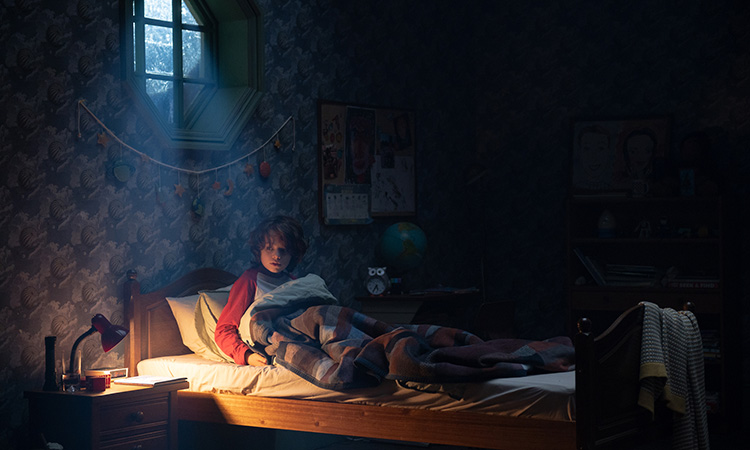Quiet, timid, sad Peter (Woody Norman) is a preadolescent only child who keeps to himself and finds anxiety in everything. Near the beginning of Cobweb, he stays behind in the classroom during recess to avoid the playground bully Brian (Luke Busey), but then recoils in terror when a spider crawls over his school desk. Kindly substitute teacher Miss Devine (Cleopatra Coleman) reassures Peter, showing him how to catch the spider without harming it and release it out the window. It is a human response, but not without its implicit problems: for the arachnophobe who traps but spares a spider instead of killing it must always live with the nagging fear that eventually it might resurface.
Certainly something is resurfacing in the ageing suburban home where Peter lives with his mother Carol (Lizzy Caplan) and father Mark (Antony Starr), in a neighbourhood with a history of child disappearances. By night, Peter hears scratches and rustles and knocks coming from the other side of the wall to his first-floor bedroom, and not long after the whispering voice of a girl (Ellen Dubin) who wants to make friends and talk, but would prefer Peter not to tell his parents about it.
“This is an old house,” Carol tells Peter, “There’s bound to be bumps in the night” – and if the wallpaper that separates Peter from his unseen nocturnal visitor depicts a repeating air balloon motif resembling the encoded pattern in a Magic Eye poster, Cobweb too withholds from the viewer its bigger picture, demanding that we look harder and pay close attention if we wish to see past all the red herrings, garden paths and false trails to a well-concealed truth. Is the girl behind the wall a ghost? A figment of Peter’s ‘overactive imagination’? An embodiment of the cracks forming in the very structure of this deeply dysfunctional household? A representation of Peter’s own closeted feelings of aggression and desire to escape? Or just a girl? Or something else entirely?
Mark thinks it’s rats, and gets Peter to help lay out some poison. “Sometimes,” he says to his sensitive son after explaining how the poison will kill the rodents, “you have to make tough decisions to protect your family, do you understand?” Peter’s parents are a little strange – and it is clear that Peter’s reclusiveness and unease about the world beyond are a part of his inheritance, even as the creaking, cracking house, already an arena of repression, proves to have a mysteriously concealed basement where things and people can be kept out of sight in the shadows. Whatever buried secrets this house and this family harbour, Peter is key to their getting out.
The feature debut of director Samuel Bodin (TV series Marianne, 2019) and written by Chris Thomas Devlin (Texas Chainsaw Massacre, 2022), Cobweb comes with a delicately criss-crossing gossamer of allusions to other films; there both to hint at the substance of the film’s narrative while also ensnaring the viewer in false assumptions. John Carpenter’s Halloween (1978), which sees a community visited by a deadly return of the repressed, is evoked all at once by the late-October setting, and by the small town’s name Holdenfield, apparently located somewhere between Haddonfield and Holden Caulfield (like the antihero of The Catcher in the Rye, Peter is both alienated and expelled from school).
Those raps and scrapes from the other side of the wall, maybe imagined, maybe real, suggest the similar setup of Frida Kempff’s psychological thriller Knocking (2021). The scenario of a beleaguered boy receiving insight and advice from an externalised voice recalls Scott Derrickson’s The Black Phone (2021), while a bloody corpse in a corridor briefly recreates a tableau the daddy of domestic dysfunction horrors, Stanley Kubrick’s The Shining (1980), and the coupling of a biracial woman with a dark basement conjures Zach Cregger’s Barbarian (2022) – in what will turn out to be a very dynamic piece of intertextuality. Yet perhaps the biggest influence here is Bob Balaban’s Parents (1989), which also aligns us with the nightmarish perspective of an imaginative young boy growing ever more paranoid about his mother and father.
Very stylishly put together and boasting some beautiful shadow play, Cobweb carefully builds to α bonkers third act, where at last the id within, kept trapped beneath the surface of suburban respectability, can come out to play. It is a twisty psychothriller in which past trauma, even when contained like that spider in Miss Devine’s classroom, may at any time come back to bite. Whether that is a metaphor for the timebomb of genetic and psychological legacy, or is something much more literal, is left for the viewer to decide – but either way, Bodin has crafted a portrait of a disturbed, phobic boy having to learn to accommodate his own toxic heritage.
Cobweb is in US theatres from 21 July via Lionsgate. It is in UK cinemas on 1 September
